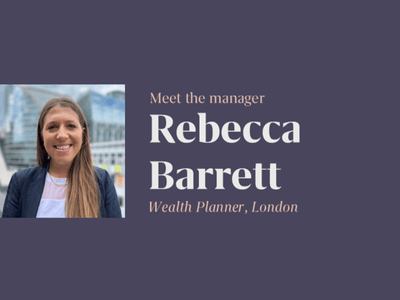A wealth manager is generally a term used to describe a professional who can advise on all aspects of your wealth. Within a wealth management firm there may well be different areas of expertise including financial, wealth planning and investment specialists. On the basis that, like most things in life, it is best to have a plan, looking for a wealth manager who can provide an all-round review of your finances is often the best solution.
Why use a Wealth Manager?
So called “life events” such as marriage, divorce, children, business sale, retirement and death are inevitable but unpredictable. Putting together a plan to optimise your savings, whilst taking advantage of hoped for gains in the stockmarket, can help protect you when it matters. Likewise, many of us do not save enough for retirement and on the basis you do not want to have to compromise on your quality of life when you stop work, having an understanding of what you need to do to realise your goals is the first step to sensible wealth management. This is where a wealth manager can help you; by assessing your goals, current income and expenditure and potential outgoings, a plan can be developed which can then be assessed on an annual basis. Finally, the added benefit of using a wealth manager is the flexibility their service can afford; for example, should your circumstances change at any point a discussion with the wealth manager can re-set the plan and investment objectives can be altered accordingly.
What makes a good wealth manager?
A wealth manager needs to wear, or have access to, many hats to fully serve a private client in today’s ever-complex financial world. On the technical side it is important to be at the forefront of tax advice so that your wealth is appropriately structured to ensure all tax allowances are utilised. An open architecture approach to investing is also important to ensure that portfolios are constructed on an impartial basis, rather than being directed down a guided product route that could limit the investment potential available to you. On the softer side, empathy and an understanding of a client’s requirements or goals are key attributes of a successful wealth manager and these are both gained by an ability to listen to clients’ needs. Finally, and often considered the most important element, is trust. Without a considerable degree of trust that your wealth manager has your best interests at heart you are unlikely to get the best out of a relationship with your wealth professional.
Discretionary vs. advisory?
Discretionary and advisory are terms that apply specifically to the portfolio management arrangements. Discretionary portfolio management is when a client gives the investment manager full discretion to manage the portfolio as he or she sees fit, in accordance with the client’s chosen investment mandate. This allows an investment manager to be responsive to market changes as stocks can be bought and sold, subject to liquidity, as and when their professional judgement dictates. Additionally, it allows an investment manager to trade on behalf of all their discretionary clients at the same time which can be more efficient and often more cost-effective.
Advisory portfolio management is a more traditional service whereby, prior to any action on the portfolio, the investment manager is required to gain approval from the client. This service is for those clients who want to be more involved in the management of their portfolio and have the time to discuss each and every transaction. This is becoming a less popular route for investors for two reasons; it can take longer to act on an investment decision if the client is unavailable which could result in an unfavourable price and, secondly, due to the additional layers of client reporting required means it is a typically more expensive service when compared to discretionary
Benefit of being part of a mid-sized firm?
Does size matter is a question applied to all industries. Generally speaking, having sufficient scale allows a firm to ride out more challenging business environments due to perhaps, increased costs or reduced revenues. However, in the wealth management space, being too large, whilst having the benefit of offering balance sheet strength, often results in a more controlled investment offering. Additionally, the larger players, often sub-divisions of larger banks, can be more short term in their nature which can lead to a culture of up-selling other products and services to their customers.
At the other end of the spectrum smaller boutiques with less than £1 billion in funds under management might lack the scale that provides their clients with the stability and security that a larger balance sheet can offer. Additionally, they may not have the resources to employ in-house research and get the access to the management of companies and third party fund managers, in which they choose to invest.
A mid-sized firm has the benefit of being nimbler in its investment decision making on behalf of clients. They should have the resources to offer a comprehensive service to clients that suits their needs and, subject to their ownership structure, might be better placed to ensure clients are put first over other stakeholders, principally, shareholders.
How much should I pay?
The cost of advice is a much scrutinised subject across the industry. More often than not, fees for investment management and wealth planning are separate with investment management fees being a percentage of the portfolio, typically in the region of 1% per annum, dependent upon the size of the portfolio. Wealth planning fees are either charged on an hourly basis for the work taken or as a percentage of the wealth on which the advice relates to.
Two important things to look for are firstly, to ensure that any performance figures you are being quoted are after, or net of, fees. Secondly, depending on how your portfolio is invested, there might well be a second layer of fees that are more difficult to calculate. For example, if your portfolio is invested in funds, the cost of those third party funds will be built into the price paid, meaning the amount paid by the end investor is not always obvious. The regulator has recently enhanced client reporting to ensure that all fees are laid out clearly to improve transparency.
Many investors choose to spurn the services of a wealth manager quoting fees as the main reason. Investing on a do-it-yourself basis can be considerably cheaper but more often than not busy professionals do not have the time or expertise to select investments and maintain a constant oversight on their portfolios. Additionally, this route may not provide access to a wealth planning professional to complement your investment portfolio.
Choosing a wealth manager to provide these services can give investors the peace of mind that their wealth is in good hands allowing them to nurture their passions or hobbies.
What makes for a successful, long term client/adviser relationship?
Clearly solid investment performance and/or effective investment advice that delivers tangible results can enhance a relationship, however, the nature of stock market investing is such that investment returns are often negatively impacted by the prevailing economic conditions.
Various industry surveys cite trust in both the individual who acts as your relationship manager and the organisation, as a key driver of client satisfaction. Trust is often built up thanks to open and honest communication. Despite much of the industry’s assets now managed on a discretionary basis, how a wealth management firm communicates with its clients, over and above the regulatory minimum requirements, is a key factor in developing long term relationships. As well as focussing on face-to-face communication and the flexibility for ad-hoc access, investors should consider a firm’s digital offering which should complement the more traditional aspects of the service. A sophisticated portal should, as well as providing 24/7 access to your portfolio information, offer enhanced security of your data and offer some protection against the increasing risks of cyber fraud.
Biggest issues you face as a wealth manager?
Issues that most industries face, and the wealth management industry is no exception to, include: the increased risk of cyber fraud and the data privacy concerns that this brings, the wider macro-economic picture, a changing political scene which can have implications on the regulatory landscape, including changes to tax law. All these are ongoing developments that firms are constantly looking to mitigate and accommodate.
Issues more specific, but not unique, to the industry include the changing demographics of the population. As people live longer, so their investment needs change and likewise the changing attitudes of younger investors means firms have to adapt to change the way they interact with them. This also gives rise to the huge issue of generational wealth transfer; the current generation of retirees is generally considered the wealthiest on record so there is a real need to assist them in ensuring their wealth is handed down the generations in the most efficient manner possible. Equally, the industry faces the challenge of educating future investors about how to manage their wealth, particularly those recipients of the upcoming wealth transfer, who may not have had the need to seek professional advice in the past.
Another challenge is the growing need to represent client values when investing on their behalf and ensure the investment style is adapted as those values evolve. An example of this is the global realisation that focussing on environmental, social and governance issues can help us make the world a better place. Naturally this shines the spotlight on the companies in which the industry invests where, thanks to their ownership structure, direct engagement with management can make a difference. The challenge is being able to have an adaptable investment approach that fits with your multiple clients’ differing values.
Potential pitfalls to look out for and avoid?
There are a number of areas investors should get familiar with when selecting a wealth management firm, to ensure they feel their interests are aligned. Firstly, it is important to understand who is making the investment decisions. Many relationship managers will be just that, your main point of contact and you may well build a strong rapport with the individual. But if he or she is not making the investment decisions on your behalf it might be worth questioning whether they can really offer you a personalised service that is tailored to your specific investment goals.
With regards to the relationship, due to the nature of the personal service that those firms with good reputations offer, it is important to act if you feel the relationship has deteriorated. Ask the investment manager if there is anyone else they could meet or if this might be an uncomfortable question, write to the senior executives who will be more than willing to help.
Ensure you are comfortable with, and understand the firm’s investment process. Many wealth managers invest exclusively in third party funds which may or may not suit but often come with additional costs which you may not be aware of. An understanding of all the costs is key to a long-lasting relationship, especially for any ancillary services should they be used.
All businesses need to have succession plans in place for when your investment manager might be looking to retire. Being such a relationship-driven industry it is worth having a clear understanding of your investment manager’s plans and who might be looking to take over responsibility for your relationship as and when applicable.
To understand a little further about the balance sheet strength of a firm, it is often worth asking what their excess liquidity is as a percentage of capital requirements. This gives an indication as to how much cash they have in the bank, which is a measure of financial strength.
Finally, you need to be comfortable that the firm is putting your interests first. It is often difficult for firms that are directly listed to balance the demands from clients and shareholders which may result in shorter term decision making across the board – which can conflict with the generally long term investment planning that typifies private investors.
Word of advice to potential clients?
If you are investing for the long term, remember it is for the long term and you will undoubtedly experience the volatility that has historically been evident across all stock markets. To help ride out these moments, you need to trust the individual you have appointed and gain the benefits from building a long term relationship, something you can also pass on to the next generation.




